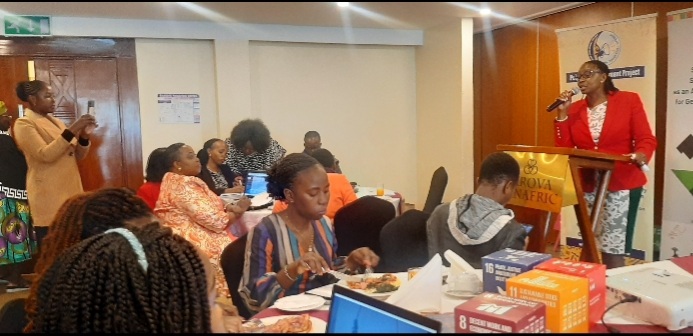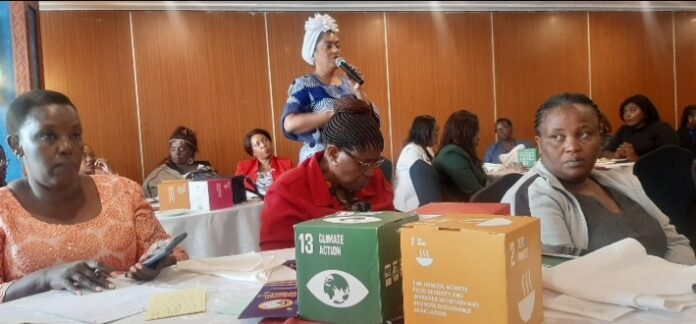By Sharon Kiburi
Nairobi, Kenya: Nairobi Women Political Leaders and Grassroot Women leaders recently held a breakfast meeting to discuss inclusivity issues regarding SDGs ( Sustainable Development Goals). The meeting was cohosted by SDGs Kenya Forum, KEWOPA & POLYCOM Development Project, with Urgent Action Fund Africa (UAF) support.
Dominating the conversation was the vitality of stressing the need to embrace the Leave No One Behind principles under the sustainable development Goals (SDGs). With the understanding of the critical role, political leaders can play through legislative formulation and significant oversight in policy formulation, implementation, monitoring, and reporting processes that directly or indirectly affect everyday citizens’ service delivery and livelihoods.

Gracing the gathering Florence Syevuo, the executive director of SDG Forum Kenya. She emphasized the need for multi-stakeholder collaboration and partnership for a collective voice toward achieving SDG Five. “It is important to have an organized civil society for impactful championing in different issues such as health, agriculture, poverty, peace & security, water & sanitation, and data,” said Syevuo. Syevuo said she hopes this will be a steady voice and the beginning of many convenings that will produce concrete solutions and inspire one another.
Nairobi’s County Women Representative Esther Passaris one of the SDGs champions in Kenya’s parliament caucus passionationately expressed her thoughts on the importance of human rights as a drive in achieving the SDGs and Vision twenty-thirty. “Women’s ability to access reproductive health services and medication needs to be at the forefront, including being able to have a safe abortion,” Said Pasari.
Passaris sighted former Kenyan leaders such as Tom Mboya and the late president Mwai Kibaki and their support of family planning because every country has to plan its population according to its resources. “The biggest impediment to poverty is the lack of family planning in countries with fewer resources.” Further, Passaris added, “Every Kenyan has a right to be treated humanely despite their religious beliefs, gender orientation identification or presentation.”
Beatrice Elachi, a Member of Parliament lauded, “I appreciated this forum’s ability to prioritize and integrate the commitment of Gender Equality Forum (GEF); however, I feel it is time to expand the horizon across all the SDGs.” Moreover, she said the time has come to have a parliament of both men and women that is inclusive of parity and equal rights without too much struggle, especially with the goodwill support of the president. “Unless the elected women leaders stop playing the politics of the men, the ordinary citizens will continue to struggle despite the increase in the number of women in leadership positions,” said Elachi.
The forum’s call to action stressed the need to deal with the root cause of gender-based violence. Which often is caused by poverty, lack of education, and bad cultural practices. Empowering women is one of the most potent ways to deal with gender-based violence.
The social security of any developing country is women making things happen. Kenya endeavors in the struggle to achieve gender equity; however, the responsibility of delivering SDGs 1,2, and 3, which are namely No Poverty, Zero Hunger, and Access to Good Health & Well-being, is primarily the responsibility of women, respectively.
In efforts to review the acceleration of implementing Gender Equality Forum(GEF), commitments to advancing gender equality. It is a national plan to “end all forms of gender-based violence and female genital mutilation by 2026”, including concrete actions about financing; leadership and accountability; laws and policies; data; and service delivery in Kenya in achieving SDG 5.














